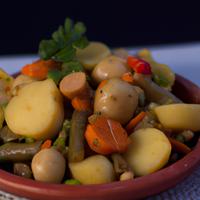
1 serving (100 grams) contains 35 calories, 2.0 grams of protein, 0.2 grams of fat, and 7.0 grams of carbohydrates.

Log this food in SnapCalorie

Nutrition Information
Calories |
83.3 | ||
|---|---|---|---|
% Daily Value* |
|||
| Total Fat | 0.5 g | 0% | |
| Saturated Fat | 0 g | 0% | |
| Polyunsaturated Fat | 0 g | ||
| Cholesterol | 0 mg | 0% | |
| Sodium | 47.6 mg | 2% | |
| Total Carbohydrates | 16.7 g | 6% | |
| Dietary Fiber | 7.1 g | 25% | |
| Sugars | 7.1 g | ||
| protein | 4.8 g | 9% | |
| Vitamin D | 0 mcg | 0% | |
| Calcium | 95.2 mg | 7% | |
| Iron | 2.4 mg | 13% | |
| Potassium | 714.3 mg | 15% | |
* Percent Daily Values are based on a 2,000 calorie diet. Your daily values may be higher or lower depending on your calorie needs.
Food Attributes
Source of Calories
About Verduras
Verduras are nutrient-rich vegetables celebrated for their versatility in cuisines worldwide. Originating from the Latin term for "greens," verduras commonly include leafy greens, peppers, squash, tomatoes, and root vegetables. Packed with essential vitamins such as A, C, and K, as well as minerals like potassium and iron, verduras support immunity, bone health, and overall well-being. High in dietary fiber, they promote digestive health and help regulate blood sugar levels. Many verduras are low in calories and fats, making them ideal for weight management. Popular in Mediterranean, Latin American, and Asian cuisines, they can be prepared fresh, roasted, sautéed, or blended into soups and smoothies. While fresh verduras are the healthiest option, canned or processed versions may include added sodium or preservatives. Incorporating a variety of verduras into your diet ensures a colorful, balanced, and nutrient-packed meal to enhance your health and vitality.



